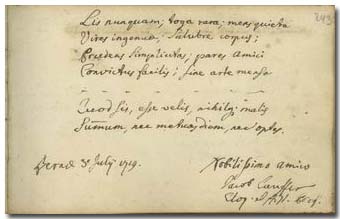
Lis numquam, toga rara, mens quieta;
Vires ingenuae, salubre corpus;
Prudens simplicitas, pares amici;
Convictus facilis, sine arte mensa;
– - – - – - – - – -
Quod sis, esse velis nihilque malis;
Summum nec metuas diem nec optes.
Nobilissimo amico
Jacob Lauffer
Eloq[uentiae] et Hist[oriae] Prof[essor]
Bernae 3º Julij 1719
|
* Martial,
Epigrammata 10.47.5-8 and 12-13.
|
|
|
|
Discord never, toga rarely, the mind in quiet; / the nature mild,
the body healthy; / wise simplicity, friends similar to yourself;
/ light dinners, simple kitchen; / dare to be what you are, and
not something different, / don't fear of the last day, but do not
even wish it.
Written to my noble
friend
Jacob Lauffer
professor of eloquence and history
In Bern, on July 3, 1719.
|
p. 243. Bern, July 3, 1719
Lauffer, Jacob
(1688-1734), Swiss historian and
professor
Jacob Lauffer (Johann Jakob L.) was born in Zofingen on July 25,
1688. He learned in the local school, and his parents wanted him
to become a pastor. He attended theology at the academy of Bern,
then of Halle and Utrecht, and he also visited other German, Dutch
and French universities. In 1714 he published a work in Amsterdam
on atheism with the title Atheus amens. In 1717 he returned
home and was elected pastor. From 1718 he became professor of
history and eloquence in Bern. He was one of the founders of the
first society of literature in Bern, and he was in active
correspondence with Johann Jacob Bodmer (1698-1783) of Zürich. In
1724 he received an official commission of continuing the
Chronicle of Bern, completed only until 1616. He continued it only
as far as 1657, when, at the age of 46, he falled down from a
staircase, and he died within three days, on February 26, 1734 in
Bern. His chef-d'oeuvre, the history of Switzerland was published
in Zürich: Genaue und umständliche Beschreibung
helvetischer Geschichte … Zürich, 1736-1739. 18 Bde. +
Register.
•
ADB • Jöcher • Michaud • SchwL |